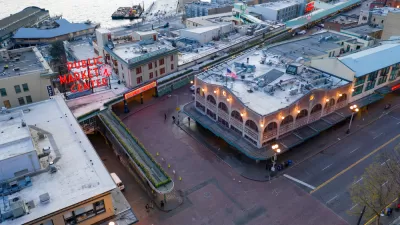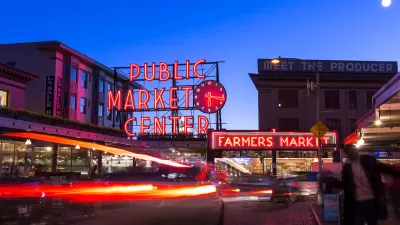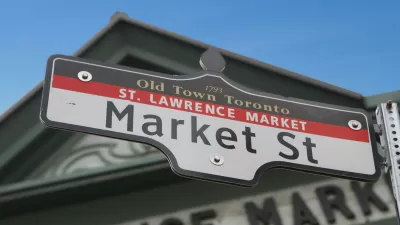It's been more than a century since the Seattle City Council decided to remove farmstands to make space for cars at the Pike Place Market. Public and political opinion is starting to see that decision as a mistake that can be reversed.

The Seattle Times Editorial Board has picked a side in one of the most heated urbanism debates to emerge from Seattle's pandemic experience: whether to block cars from accessing the streets in front of the Pike Place Market.
"City and Pike Place Market officials should make a priority of getting cars off the three blocks of Pike Place fronting the market, and the block of Pike Street that connects the market to the city," according to the editorial board.
A news article by David Kroman for The Seattle Times, published earlier in December, documents the growing public and political support for the change after the pandemic created an opening for a conversation about an idea that had previously been considered a political third rail.
Now The Seattle Times editorial board is willing to say what only the most ardent multi-modal advocates have been saying for years: it's probably not a good idea to allow cars and people to mix in one of the most visited corners of the city.
"If it was ever a good idea to allow motorists to drive through the crowds jostling along the brick street to browse market wares or stage selfies, that day has long passed. It shouldn’t take a heroic civic effort to block traffic from a minuscule fraction of downtown streets to benefit pedestrians who flock to the market by the millions each year," according to the editorial.
Any potential car-free future for the market is still a long way off, however. So far city officials with the power to expedite the car-free changes are only promising meetings—which could take a long time in a city famous for the 'Seattle Process,' which the editorial describes as "endless conversations and stalled progress."
FULL STORY: Let pedestrians enjoy Pike Place Market without cars

Planetizen Federal Action Tracker
A weekly monitor of how Trump’s orders and actions are impacting planners and planning in America.

San Francisco's School District Spent $105M To Build Affordable Housing for Teachers — And That's Just the Beginning
SFUSD joins a growing list of school districts using their land holdings to address housing affordability challenges faced by their own employees.

The Tiny, Adorable $7,000 Car Turning Japan Onto EVs
The single seat Mibot charges from a regular plug as quickly as an iPad, and is about half the price of an average EV.

With Protected Lanes, 460% More People Commute by Bike
For those needing more ammo, more data proving what we already knew is here.

In More Metros Than You’d Think, Suburbs are Now More Expensive Than the City
If you're moving to the burbs to save on square footage, data shows you should think again.

The States Losing Rural Delivery Rooms at an Alarming Pace
In some states, as few as 9% of rural hospitals still deliver babies. As a result, rising pre-term births, no adequate pre-term care and "harrowing" close calls are a growing reality.
Urban Design for Planners 1: Software Tools
This six-course series explores essential urban design concepts using open source software and equips planners with the tools they need to participate fully in the urban design process.
Planning for Universal Design
Learn the tools for implementing Universal Design in planning regulations.
Smith Gee Studio
City of Charlotte
City of Camden Redevelopment Agency
City of Astoria
Transportation Research & Education Center (TREC) at Portland State University
US High Speed Rail Association
City of Camden Redevelopment Agency
Municipality of Princeton (NJ)





























